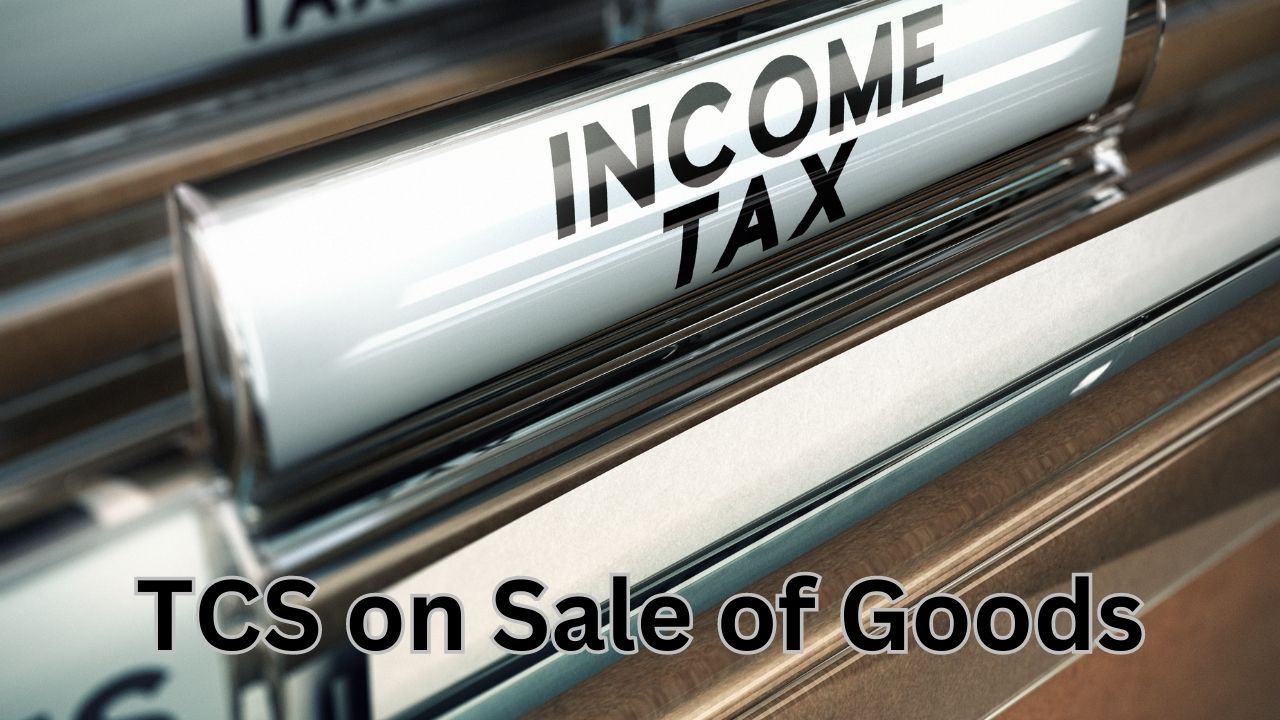TCS on Sale of Goods:
Let’s Read the Provisions of Law first:
Section 206C (1H) Every person, being a seller,
who receives any amount as consideration for sale of any goods of the value or aggregate of such value exceeding 50 lakh rupees in any previous year, (other than the goods being exported out of India or goods covered in sub-section (1) or sub-section (1F) or sub-section (1G))
shall, at the time of receipt of such amount, collect from the buyer,
a sum equal to 0.1 per cent of the sale consideration exceeding fifty lakh rupees as income-tax
Provided that if the buyer has not provided the Permanent Account Number or the Aadhaar number to the seller, then the provisions of clause (ii) of sub-section (1) of section 206CC shall be read as if for the words “5%”, the words “1%” had been substituted:
Provided further that the provisions of this sub-section shall not apply, if the buyer is liable to deduct tax at source under any other provision of this Act on the goods purchased by him from the seller and has deducted such amount.
Explanation.—For the purposes of this sub-section,—
(a) “buyer” means a person who purchases any goods, but does not include,—
(A) the Central Government, a State Government, an embassy, a High Commission, legation, commission, consulate and the trade representation of a foreign State; or
(B) a local authority as defined in the Explanation to clause (20) of section 10; or
(C) a person importing goods into India or any other person as the Central Government may, by notification in the Official Gazette, specify for this purpose, subject to such conditions as may be specified therein;
(b) “seller” means a person whose total sales, gross receipts or turnover from the business carried on by him exceed 10 crore rupees during the financial year immediately preceding the financial year in which the sale of goods is carried out, not being a person as the Central Government may, by notification in the Official Gazette, specify for this purpose, subject to such conditions as may be specified therein.
Now Let’s understand in easy language:
Tax Collected at Source (TCS) is a mechanism where the seller collects a certain percentage of the sale consideration as tax from the buyer and deposits it with the government. TCS is applicable on specified transactions, including the sale of goods, to ensure proper tax collection at the source.
Applicability:
TCS on the sale of goods is applicable when the seller’s turnover exceeds the prescribed threshold, the threshold is Rs. 10 crore. If the seller’s turnover exceeds this amount, they are required to collect TCS from the buyer on the sale of goods.
TCS Rate:
The TCS rate on the sale of goods is generally 0.1% of the sale consideration.
TCS Collection Process:
- Collection from Buyer: The seller, who is required to collect TCS, collects the specified percentage of the sale consideration as tax from the buyer at the time of receiving the payment.
- TCS Amount: The TCS amount is calculated on over and above Rs.50 Lakh. For instance, if the sale consideration is Rs. 55,00,000, the TCS to be collected on Rs.5 Lakh at a rate of 0.1% would be Rs. 500.
- Invoice and TCS: The seller issues an invoice to the buyer, which includes the TCS amount as a separate line item. The buyer makes the payment, including the TCS, to the seller.
TCS Reporting: The seller is required to report the TCS collected from the buyer in the TCS return. This return provides details of the collected TCS, including the PAN of the buyer and other relevant information. The TCS return is filed electronically on the government’s online portal.
TCS Credit to Buyer: The TCS amount collected from the buyer is reflected in the buyer’s Form 26AS, which is an annual tax statement. The buyer can claim credit for this TCS amount while computing their overall tax liability.
FAQs:
- Who is Required to Collect TCS on Sale of Goods?
The seller of goods Who’s turnover exceeds 10 Crore in Previous year and who receives consideration exceeding INR 50 Lakhs for the sale of goods is obligated to collect TCS from the buyer under Section 206C(1H) of the Income Tax Act.
Example:
Seller S operates a wholesale business and deals in electronic goods. In the previous financial year, Seller S’s turnover exceeded INR 10 Crore. During the current financial year his turnover is Rs.8 Crore, but because his previous year turnover is exceeding the limit so he is liable to deduct TDS in current year.
Seller S sells goods to various buyers, with one of the transactions involving a sale consideration exceeding INR 50 Lakhs.
Transaction Details:
- Buyer: Buyer B
- Goods Sold: Electronic gadgets
- Sale Consideration: INR 60 Lakhs
According to the provisions of Section 206C(1H) of the Income Tax Act, since Seller S’s turnover in the previous year exceeded INR 10 Crore and the sale consideration from Buyer B exceeds INR 50 Lakhs, Seller S is obligated to collect TCS from Buyer B at a rate of 0.1% of the sale consideration.
TCS Calculation and Collection:
- Sale Consideration: INR 60 Lakhs
- TCS Amount: 0.1% of INR 10 Lakhs (60 Lakh-50 Lakh) = INR 10,000
Seller S collects INR 10,000 as TCS from Buyer B at the time of receiving the payment for the goods. The total amount received from Buyer B after collecting TCS is INR 60,10,000.
Seller S is required to report and remit this collected TCS to the government within the prescribed time frame.
- On Which Amount is TCS Applicable?
TCS under Section 206C(1H) is applicable on the total sale consideration after reducing the threshold limit of INR 50 Lakhs
- What is the Section for TCS on Sale of Goods?
The relevant section for TCS on the sale of goods is Section 206C(1H) of the Income Tax Act.
- Is TCS Applicable on the Sale of Goods?
Yes, TCS is applicable on the sale of goods under the provisions of Section 206C(1H), effective from October 1st, 2020.
- Who is Eligible for TCS on Sale of Goods?
TCS on the sale of goods is applicable to every seller who receives consideration exceeding INR 50 Lakhs for the sale of goods and who’s Previous year turnover exceeds Rs.10 Crore
6. When Should TCS be Deducted?
TCS is collected by the seller at the time of receiving the amount from the buyer.
7. How is TCS Recorded on Sale of Goods?
TCS on the sale of goods can be recorded in various ways depending on the transaction. One possible method is as follows:
- Debit Buyer’s Account
- Credit Sales Account
- Credit GST Account
- Credit TCS on Sale of Goods Account
- Is TCS Collected on the GST Amount?
Yes, TCS under Section 206C(1H) on the sale of goods is also collected on the GST amount.
10. Adjustment for sale return, discount or indirect taxes
It is requested to clarify that whether adjustment is required to be made for sales return, discount or indirect taxes including GST for the purpose of collection of tax under sub-section (lH) of section 206C of the Act.
It is hereby clarified that no adjustment on account of sale return or discount or indirect taxes including GST is required to be made for collection of tax under sub-section (IH) of section 206C of the Act since the collection is made with reference to receipt of amount of sale consideration.
11. Fuel supplied to non-resident airlines
It is requested to clarify if the provisions of sub-section (IH) of section 206C of the Act shall apply on fuel supplied to non-resident airlines at airports in India. To remove difficulties it is provided that the provisions of sub-section (1 H) of section 206C of the Act shall not apply on the sale consideration received for fuel supplied to non-resident airlines at airports in India.
To clear your more queries, Watch below video









